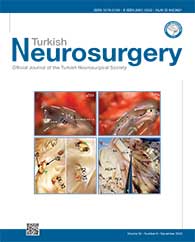2Istanbul University-Cerrahpasa, Cerrahpasa Medical Faculty, Department of Physiology, Istanbul, Turkey
3Istanbul University-Cerrahpasa, Cerrahpasa Medical Faculty, Department of Neurosurgery, Istanbul, Turkey
4Baskent University, Department of Neurosurgery, Istanbul, Turkey
5Istanbul Health Sciences University, Istanbul Education and Research Hospital, Department of Neurosurgery, Istanbul, Turkey DOI : 10.5137/1019-5149.JTN.42017-22.2 AIM: To define the substantial role of the TLR4 signaling pathway in the MyD88-dependent pathway, and to evaluate the results of TLR4 activation in nucleus pulposus cells. Moreover, we aim to associate this pathway with intervertebral disc degeneration and magnetic resonance imaging (MRI) findings. Additionally, the clinical differences among patients and the effects of their drug use will be evaluated.
MATERIAL and METHODS: Eighty-eight adult male patients with lower back pain and sciatica underwent MRI studies, which showed degenerative changes. Disc materials were obtained intraoperatively from those who underwent surgery for lumbar disc herniation. These materials were kept in freezers at ?80°C without any delay. Then, the collected materials were examined using enzyme-linked immunosorbent assays.
RESULTS: Modic type I degeneration had the highest values of all markers, whereas Modic type III degeneration had the lowest values. These results verified that this pathway plays an active role in MD. Moreover, contrary to the current knowledge on which Modic type inflammation is more dominant, we showed that it is the Modic type I phase.
CONCLUSION: The most intense inflammatory process was observed in Modic type 1 degeneration, and the MyD88-dependent pathway was found to play a key role. While the most intense molecular increase was detected in Modic type 1 degeneration, the lowest levels were observed in Modic type III degeneration. It has been observed that the use of nonsteroidal anti-inflammatory drugs affects the inflammatory process through the MyD88 molecule.
Keywords : Toll-like receptor, MyD88, Modic degeneration, Back pain, Degenerative disc disease, Immune system




